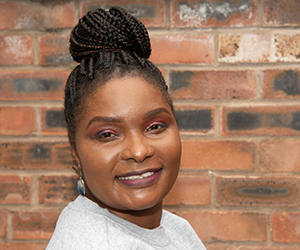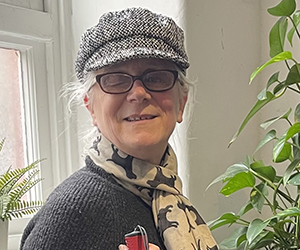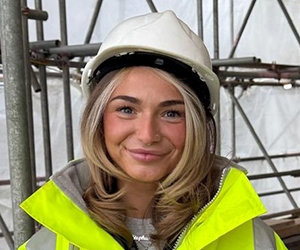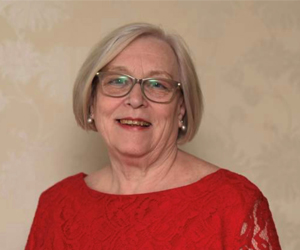In Wigan Borough women are in leading roles at many of our local organisations.
Many more women are working hard every day in our local communities to support others and to help address inequalities and create change.
Here are just some of their stories:
Esnath’s story
Leigh resident, Esnath, is a talented dancer, choreographer, fashion designer, hairdresser, and make-up artist. She also regularly volunteers to help others at Leigh community organisation, Everything Human Rights, and is described by those who know her as, ‘a real community leader, who brings people together’.
leader, who brings people together’.
Esnath says:
"I was 23 when I first came to the UK from Zimbabwe, and I was very excited. At that time, I didn’t miss anything from back home, not even my friends. I’d look at how everyone was dressed and think, ‘Wow’. I’d make phone calls to family back home and say, ‘I’m here!’
"I didn’t come from a poor background, but I wanted to better myself and I imagined that I could do that here.
"I got a diploma in fashion design (from the University of Central Lancashire) in Preston and went on to study hairdressing and make up too. I made and sold clothes to help pay for my education.
"The people on my street in Leigh have always made me feel welcome. I have good friends and neighbours, and I help others in the community whenever I can.
"Of course, there have been times when I have missed home and felt as though I didn’t have a shoulder to cry on. British law makes it difficult for friends and family to visit, even for a short time. Visitors are often denied visas. It isn’t fair because our elderly parents might want to visit, but they don’t want to stay here permanently. The weather in England is too gloomy. They always want to get back home and see the sun again!
"Refugees come from lots of different backgrounds and for lots of different reasons. Some people are running from difficult circumstances. Every person is an individual with their own story so it’s important not to make assumptions about anyone.
"It’s important to take the time to listen and understand."
Grace's story
Campaigning for rights for young people has always been important to Grace, who was a member of Wigan and Leigh Youth Cabinet. And as she’s got older and started to embrace her own disability, so has campaigning for people with disabilities.
Grace says:
"I would like to see more forums and safe spaces for young people with disabilities, awareness and reduction of harmful language used against people with disabilities, and more accessibility in the borough.
"This is important to me as growing up with a disability I felt different, judged, and rejected. That’s why I want to support young people to feel confident within their own skin and give them the support I wish I’d had when I was growing up because no young person should feel that way. In the future I hope to create forums for young people to chat, make new friends and be able to talk and get off whatever is on their minds with likeminded people.
"Through the years I never accepted that I have a disability but as I have got older, I have realised that it’s a huge part of myself I cannot change, but it also doesn’t define me as a person which is a key message I want to share with other young people. I am still able to achieve my goals in my life.
"Being a member of Wigan and Leigh Youth Cabinet helped me improve my confidence to speak out about any issues I think need addressing and I would love to see bullying diminished.
"Bullying makes people feel more isolated and this is why I also want more education on disabilities as people fail to acknowledge they can be hidden. They can be mental or physical and affect people differently. I’d also like to see somewhere to anonymously voice issues to make people feel more comfortable with sharing their problems in the first place."
If you’re a young woman who would like to join Wigan and Leigh Youth Cabinet so you can get your opportunity to have a say and make a difference for young people please email REACH@wigan.gov.uk
Terri's story
Terri works as the North-West regional campaigns officer for the Royal National Institute of Blind People (RNIB). Terri kindly shared her story with us about growing up with a severe vision impairment, and her experiences in the workplace.
Terri says:
"My role at the RNIB involves being a two-way conduit between and working collaboratively with blind and partially sighted people and organisations.
"I was born with a condition called Aniridia, so am severely sight impaired, legally blind. It’s a genetic condition where the iris (the coloured part of your eye) is either completely or partly missing, so the pupil does not contract or expand to control the amount of light coming into the eye. Normally your pupils expand to let lots of light in if you’re in darkness or reduce the light if you’re in a bright environment so that you can see more easily but mine don’t do that. I’m particularly sensitive to sunshine and darkness and everything is very blurred.
"Being born with the condition in the 60’s, my dad gave up a good job and life in Slough moving the family to South-East London so that I could attend a specialist day school there and as he also had the condition I didn’t get lots of special attention at home. If I fell over, he’d just tell me to get up but that was the right thing to do!
"I’ve had a number of jobs over the years. In the early days I worked for private businesses in London, and I didn’t always have positive experiences and often didn’t find my employers to be especially empathetic.
"Until my 30’s, I often felt like a second-class citizen and around that time I had my children and was a home maker rather than being in the workplace for a while.
"It was a conversation with someone from Embrace (a local charity for people with disabilities and their families) that turned things around for me. They suggested I try volunteering, which I did, and that eventually resulted in me being where I am now, working for a national charity.
"In my current role, my impairment is an asset, because I can empathise with our customers, using my lived experience to back up resources and information we provide, and advocate on what will really be effective."
Steph's story
After working in the beauty industry for nine years, Steph wanted a change of career. She wasn’t sure what direction to take and so took a business admin apprenticeship with Wigan Council as she knew this would give her the opportunity to work with lots of different council services and potentially discover what she wanted to do. She found she really enjoyed working on projects and within construction and towards the end of her apprenticeship secured an Assistant Capital Projects Officer role at the council, giving her the opportunity to work in construction.
working on projects and within construction and towards the end of her apprenticeship secured an Assistant Capital Projects Officer role at the council, giving her the opportunity to work in construction.
Steph says:
"Being a young woman in the construction industry has been a great experience so far and I’m fortunate enough to say that everyone around me has been a great support.
"It is a male dominated field, but times are moving on now and we are starting to see more women doing jobs in those industries that traditionally only men worked in. I’m actually finding it very rewarding to know I’m a woman in what was a male dominated industry.
"On my apprenticeship, both of my line managers are women in construction work, so they have been great for me to look up to.
"They’re both doing so well in their careers that I eventually hope to carry on and do what they are doing one day.
"If there is a young woman reading this who is thinking about working in construction but who might be a little nervous about it being one of the traditionally male industries, I would say, go for it! Construction was never on my list as a possible career, but you’ll never know what you really want to do until you try it out.
"Now I’m in the field I’m so keen to develop all my skills in this area as I’ll be able to go in so many different directions in the future, it’s been a great opportunity for me."
Nadia’s story
Nadia is the voluntary services manager at Wrightington Wigan and Leigh Teaching Hospitals NHS Foundation Trust. She also has some long-term health conditions including Seronegative Rheumatoid Arthritis and hearing loss.
Nadia says:
"I oversee over 300 volunteers across our different hospital sites. A volunteer’s role is about making things nicer for patients, helping them on their journey at what can often be a difficult time.
"I studied languages and was originally planning to be a translator. I was offered a big role at an international bank and was considering taking it, but I’d started to evaluate what I wanted to do with my life and knew it was important to me to do something that was ethical, involved helping others and was personally rewarding.
"My health conditions include Seronegative Rheumatoid Arthritis, fibromyalgia (bouts of extreme pain and tiredness), and hearing loss. I was only diagnosed at age 21 (and with the fibromyalgia just last year).
"I’ve had experience as an in-patient and as an out-patient so I had started to think that I might like to do something to do with healthcare.
"I took this job as a temporary role at first but have now been here for 11 years and I think my experiences of healthcare help me to support patients more effectively as I can empathise and understand what they might be experiencing, especially for anyone with a long-term health condition. I understand the effects this can have on a person’s mental health as well as physical health and my hearing loss helps me to imagine how people with other sensory losses, such as sight loss, may be feeling.
"It's important in any workplace to have a diverse workforce with different life experiences if you want to offer your customers a good service. I’ve always found the NHS to be a great employer, and my manager has been supportive from the start. It’s the small things that can make such a difference.
"To other people with disabilities, I would say, you do have an important place in society. It upsets me if people don’t feel they have a role.
"Volunteering could be a great starting point. You also need to find the right company that has a diverse workforce and appreciates what you can offer.
"I wouldn’t want anyone to think that your disability will hold you back."
Dorothy's story
Dorothy, from Leigh, is trustee and treasurer at The Bridge (external link), a local community organisation set up to address food poverty, food waste, and social isolation. The Bridge has a food shop and café, using food industry surplus that would otherwise be thrown away, and helps to bring people together.
helps to bring people together.
Dorothy says:
"I got involved in The Bridge through my husband originally. He is part of Leigh Rotary Club, who funded the organisation when it was first set up. I’ve always been in business but I’d sort of retired although if I’m honest I’ve always been a bit of a workaholic, I like being busy.
"We started as a small organisation but the Covid period had a big impact, putting lots of people into crisis, so as the demand grew so did our organisation and we had to move to bigger premises.
"We now have 5,000 members and probably see around 200 people a day, five days a week. We have a 7,500 square foot warehouse, three refrigerated vans and 14 staff as well as many volunteers.
"It’s hard work but I do enjoy the feeling that we are helping so many people.
"I’m proud to be a woman from Leigh so I’ve always liked being so involved in my local community. I’ve done all sorts of things; I’ve been part of the soroptimists for 42 years, and I started my fundraising journey as a member of Friends of Leigh Hospital.
"One of my highlights was when the soroptimists sponsored a young Tibetan girl with her education and helped her to get a scholarship in Kentucky, USA, and I was honoured to go to her graduation. I enjoyed organising and helping to run centenary events at Pennington Flash and getting some nice Christmas lights in Leigh was also an achievement.
"There are a lot of challenges for women today. I see lots of different people through my work at The Bridge and I would say that childcare is still a big challenge. My granddaughter is about to go back to work after maternity leave and childcare is so in demand it’s hard to access.
"If I could pass on advice to other women I would say, be brave and have confidence in your abilities.
"Confidence does come as you go through life, but you have to believe that everyone can be successful. Learn from your failures and pick yourself up, don’t give up, and move on."
Michelle's story
Michelle Anderson was born and raised in Wigan and was an original member of the town’s first ever women’s rugby league team. Michelle tells us what drew her to rugby league, her highlights of playing and coaching and what she thinks still needs to change in women’s sport.
Michelle says:
"I’ve always been a massive Wigan Warriors fan. I remember going to Wembley with my grandad in 1984 to see them play against Widnes and that was it, I was hooked! My grandad helped me get a role as a stewardess in the Douglas Stand and I loved it, I just loved everything about rugby.
"In the summer holidays I would play on the fields at St Catherine’s recreation ground in Scholes with the lads’ teams and in 1988 I joined Wigan’s first women’s rugby league team based in Ince.
"We played 9-a-side and there were no lower age restrictions in the women’s team, which is hard to believe looking back. The regulations just hadn’t been developed for the women’s sport at that time.
"None of the men’s clubs were interested in supporting a women’s team back then. We trained on the road near St. Patrick’s Church. I remember going round to the clubs with a handwritten letter, asking them to take us on but I think women’s rugby league was seen as a bit of a joke. I definitely came across difficult views and some men’s attitudes towards us weren’t great, we always had to put up with inuendo, comments about, ‘women in mud’, that sort of thing, so it was hard to be taken seriously.
"When you look at how far we’ve come in that short time, now most clubs in the Super League have a women’s team, it’s marvellous really.
"I continued to play, moving to Yorkshire where I played for Halifax, and going on to coach both girls’ and boys’ teams, including being asked to support England’s under 16’s camp.
"There were so many highlights over the years. It’s the small things that mean the most, like when you suddenly see something click with a young person or as a team and you know you’ve had some input. When I was playing for Halifax, we played in France and when I was in my mid 30’s we played a few games in Russia. There had been a communications mix up and they thought we were the national team, so we ended up playing against Russia and against Kazakhstan – the women were massive, and we didn’t win – but it was all good life experience!
"There’s still work to be done in sport to achieve equality – equal pay for a start. I also think more needs to be done at a grass roots level. I work in a primary school now and a lot of PE is about building skills. I think it’s important to introduce children to competitive sport at a young age, to get them to find the sport for them, before they get stuck behind computers! It’s so good for their wellbeing.
"I don’t feel like I’ve been a pioneer, to me I’ve just been doing what I loved, but it is important for young girls to be able to find role models. It was hard for us back in the day with no proper training facilities or safeguarding. And I know we had to push though things like that to make it possible for girls and women to play in the way they can today – so it is nice to remember that I’ve been part of something.
"To any young girl who might be interested in playing rugby league today, I would say just go for it! It is competitive and it can be brutal at times but the friendships you can make and the opportunities and connections it can give you are fantastic so get involved."